Ketamine offers peace of mind for Aspen residents

NeuroSpa and Roaring Fork Neurology/Courtesy photo
It’s the kind of thing that might most often be associated with the wild side of the Roaring Fork Valley. But ketamine, and other psychedelic therapies, are growing in popularity with local doctors offering alternatives to medication and integration with therapy.
In Colorado, ketamine is a legally classified Schedule III drug (Schedule I drugs are considered the most dangerous), which permits its use for medical purposes under specific regulations.
At both The NeuroSpa in Aspen and Basalt and at Satori Integrative Medicine Clinic in Glenwood Springs, ketamine treatment is currently available to patients seeking assistance with treatment-resistant depression, treatment-resistant anxiety, PTSD, chronic pain, grief, substance abuse recovery, or even creativity and personal growth.
“The way I describe it to people is that they get their lives back,” said Dr. Tamara Stoner of Satori Integrative Medicine Clinic. “It lets you be who you are, recover from whatever it is that you’re trying to recover from.”
Stoner grew up in the valley and has had her clinic for the past five years; she was an anesthesiologist for more than 20 years and did evidence-based medicine research. According to her, ketamine works faster, is more effective, and has a more appealing side effect profile than standard antianxiety and antidepressant medications.
“It’s equivalent to a hard reset for your central nervous system, your brain,” she said. “It allows parts of your brain that don’t normally communicate particularly to be in touch with each other.”
The next 48 to 72 hours after treatment also create a neuroplasticity in the brain that allows an individual to rapidly learn and unlearn patterns, according to Stoner.
Dr. Brooke Allen, medical director at The NeuroSpa, gave an example of a patient who went through ketamine therapy with her after feeling incredibly stuck in their life.
“Stuck with anxiety, stuck with depression, and felt like they couldn’t leave home,” Allen said. “After a series of sessions that also included preparation and integration, they moved out of state, are living on their own, and have a job. They’re a much more high functioning individual. It can be a great way to provide healing and closure.”
Like Stoner, Allen also finds it important to integrate therapy with the psychedelic treatment, providing both preparation and integration before and after the intramuscular therapy.
“You do get these really beautiful effects like suppression of anxiety and depression for short periods of time, but ketamine is a tool, the same way breathwork is a tool,” she said. “It’s all about the support around that tool that helps someone shift their mindset or worldview. You could say ketamine is a cure, but it’s not the ketamine itself. It’s really the container of everything around it.”
Stoner agreed that ketamine is most effective in the context of therapy treatment around it.
Allen, along with two other members of her team, has also been participating in a year-long program to hold a facilitator license for psilocybin journeys. She has applied for The NeuroSpa to become a healing center and anticipates to open this additional offering by late summer.
Psilocybin and ketamine provide very different journeys, according to Allen. A ketamine journey usually lasts 90 minutes where most people are either reclined in a chair or lying on the floor with an eye mask and noise-cancelling headphones. She said that music can be one of the most important parts of this journey.
A mushroom journey, on the other hand, lasts around six hours. She said it’s a more somatic experience, where people move around the room and often talk during the journey.
“We are really just there to support them,” she said, “and give the person the time and ability to heal themselves.”
Studies on psilocybin treatment particularly highlight the psychedlic’s ability to assist with treatment-resistant mental health in addition to quitting smoking and drinking less alcohol. While psilocybin are a Schedule I drug in Colorado and illegal under federal law except for clinical research, the state can issue licenses for medical-assisted use of the drug.
Whether it be ketamine or psilocybin, Allen and Stoner encourage those interested in psychedelic therapy to seek out a trusted professional for treatment.
“In the psychedelic space, whether it’s underground or in a more outward, visible way … do it with people you feel safe with,” Allen said.
She highlighted that a high number of sexual assaults have occurred while someone has been in a “non-ordinary state of consciousness.” At The NeuroSpa, Allen always has two guides at all times in the room for a patient’s safety.
Stoner also urges those experiencing any type of mental health issue or chronic pain to consider trying psychedelic therapy earlier on in their own journeys.
“No one comes as their first choice. They’ve tried most everything else available and failed,” she said. “We would love to see people earlier in the process … Progress is a little easier to find.”
Family, friends mourn loss of prominent Aspen house lifter
From the entrance to Aspen to the exit as you head toward Independence Pass, you might not know, but you’re passing dozens of buildings that have been moved, raised, or otherwise altered from their original location.
New Colorado gun law triggers response in Pitkin County, Basalt
Colorado’s new law introduces sweeping restrictions on the manufacture, sale, and ownership of certain semiautomatic firearms and devices designed to increase firing speed.









